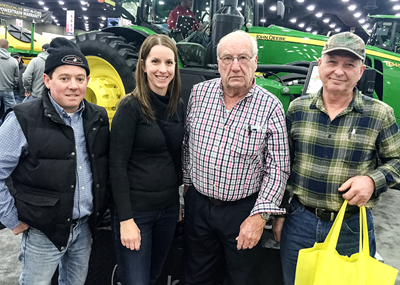Trip to Louisville is annual ritual for Frank Lafferty
By Farms.com Media Team
Frank Lafferty reckons he’s missed maybe three shows since 1972. That has to qualify him as an expert on why it’s worth the annual trip from Maidstone, Ontario to the National Farm Machinery Show in Louisville, Kentucky.
“This is the best show there is,” said Lafferty as Farms.com caught up to him on Day 1 at the recent event.
This year he made the trip with three friends. Tom Divitaris, Stephanie Divitaris, and Richard Renaud will all stay over three nights and make two day-trips to the show.
 |
| From left, Tom Divitaris, Stephanie Divitaris, Frank Lafferty and Richard Renaud at the National Farm Machinery Show in Louisville, Ky. |
The NFMS is the largest indoor farm show in the U.S. and attendance this year was just shy of 300,000. Held at the Kentucky Exposition Center, the 2016 event offered more than 880 exhibitors displaying on 27 acres of floor space.
Lafferty himself farms on 4,300 acres; mostly cash-crops, but also some sweet corn.
He says “business is all right. Our Canadian dollar is helping us at the moment.”
And Lafferty is in Louisville looking to buy. He is “looking for a couple of things” and says he can’t worry about the value of the dollar when purchasing machinery south of the border.
“There are things I can find here that I cannot get at home. So I will pay the U.S. dollar value.”
Lafferty has many fond memories of the show over the years. He actually competed in the Championship Tractor Pull for 10 years.
“That was a lot of fun, and I met a lot of great people.”
The tractor pull has been part of the NFMS for 47 years. Offering $200,000 in prize money, the pull draws more than 500 teams to apply annually, and the event narrows the competitive field to 180 drivers.